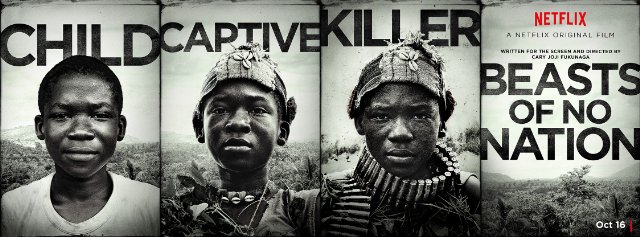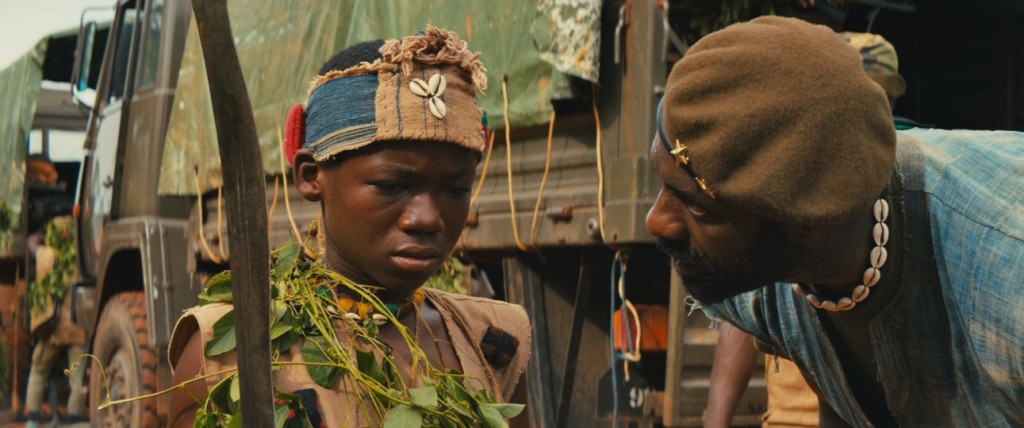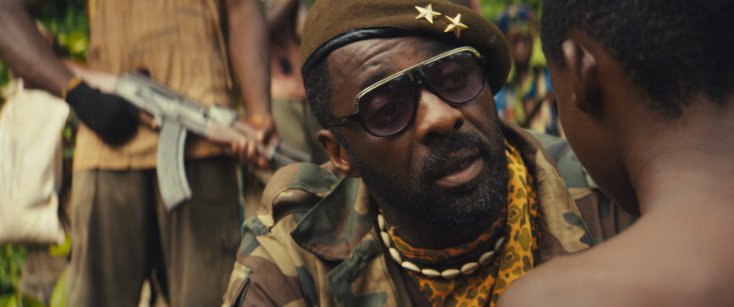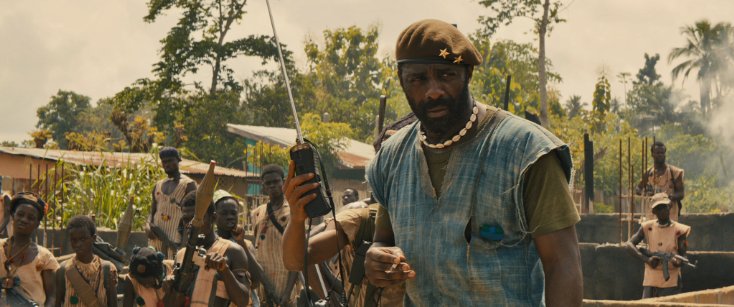Our guest blogger is hobbyist film and TV series reviewer and writer Harry Casey-Woodward. On th-ink.co.uk Harry will be writing a series of posts in which he will be sharing his opinions on things he has watched.
Beasts of No Nation, 2015, cert 15, dir Cary Joji Fukunaga, 4/5
You could say this is an important film not just for its content but also because it’s the first feature-length movie produced by Netflix. I have mixed feelings for Netflix. It’s fun to use but I find its content rather geared to American mainstream movies. You still have to seek out international and cult/arty films on DVD. Not that I mind, because I prefer owning physical copies of films and music rather than having exhausting amounts of movies and songs online that don’t belong to me even if I pay a subscription fee.
I also disagree with the way Netflix have released their first movie. They pushed for cinematic release but a few cinema chains refused to show the film as Netflix released it on their channel at the same time. As representatives of these cinemas argued, why would people pay for cinema tickets when they could watch the movie at home? Their fears appear justified, for although the movie has over three million views online it only made $50,000 back from the $12 million Netflix doled out to distribute it in cinemas.
These cinemas have furthered accused Netflix of pushing for cinematic release just so they can qualify for an Academy award. If this is so, it feels slightly cynical to use a film about child soldiers just to get an award.
Not that it doesn’t deserve one. Cinematic politics aside, this is an almighty film. Based on a 2005 novel by Nigerian-American Uzodinma Iweala, the story is set in an unnamed African country (possibly Nigeria) and revolves around a boy named Agu played by first-time Ghanaian actor Abraham Attah. He lives the typical life of a fun-loving cheeky kid, safe within the buffer zone of a war-torn country with his friends and family. That is, until government troops storm Agu’s village, declare the men rebel spies and execute them, including Agu’s father and brother.
Agu escapes into the bush where he is captured by the real rebel army, mostly comprised of boys his age. He is trained by the formidable Commandant (played by British star Idris Elba) to be a guerrilla fighter and is thrust into a nightmarish world of bullets, blood and black magic.
For a young actor in his first role, Abraham Attah is magnificent. He doesn’t use a great deal of dialogue or expression and even his poetic interior monologue is used sparsely (as monologues should be). Nevertheless, he convincingly portrays the fear and trauma his character suffers, and the emotional damage and ageing war inflicts on him. Everything he says and does feels real, raw and pure: an incredibly mature performance from someone so young.
All the acting in the film is good, so much so it’s more like watching a documentary than a work of fiction. But the show is almost stolen by Idris Elba, whose portrayal of a guerrilla warlord is electrifying. His very presence and energy commands the screen along with his troops, especially during the scenes when he’s giving dramatic speeches to whip his boys up for battle. It’s great to see an actor we’re used to seeing play heroic characters like DCI John Luther effectively portray a devious and conflicted character like the Commandant. He proclaims to be a new father figure for the lost boys he recruits and that he’s given them fresh purpose in life, yet he’s willing to let them kill or be killed for his own ideals while never actually committing any violence himself. Rather, he’s more effective at inciting others to violence, which is what makes him so menacing. Yet he appears to genuinely care for Agu and this little bit of humanity is enough to make the audience feel some sympathy and respect for such a disturbing character, a great achievement on the film’s part.
The style of the film itself is an unflinching tour de force. The audience is thrust headlong into gritty realism, savage tension and heartbreaking tragedy. Rather than being steeped in politics, the film is more intent on portraying the psychological and emotional impact of war on its human characters. If there are any issues with the film, it’s that sometimes its portrayal of such psychological trauma is rather simplistic and idealistic, i.e. a child soldier can only recover from his experiences if he lets himself become a child again. You could also argue this is clearly another ‘issues’ drama, where the film is spending all its effort to show you how bad something is, along with the overriding strength of the human spirit etc etc. However, the film’s message is very clear and very relevant. Even if I judge Netflix, I praise them on getting behind such a masterpiece.



